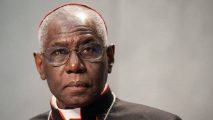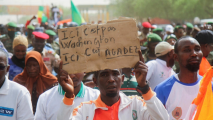Categories
Recent Posts
- Cameroon is broken: Who can fix it?
- Cameroonian beer and soft drinks exports soar by 73% and 46.6% in 2022
- Southern Cameroons Crisis: 2 teachers abducted in the North West
- World Bank says despite high potential, 75 vulnerable economies face ‘Historic Reversal’
- Cardinal Robert Sarah says Western prelates have lost their nerve
Archives
- April 2024
- March 2024
- February 2024
- January 2024
- December 2023
- November 2023
- October 2023
- September 2023
- August 2023
- July 2023
- June 2023
- May 2023
- April 2023
- March 2023
- February 2023
- January 2023
- December 2022
- November 2022
- October 2022
- September 2022
- August 2022
- July 2022
- June 2022
- May 2022
- April 2022
- March 2022
- February 2022
- January 2022
- December 2021
- November 2021
- October 2021
- September 2021
- August 2021
- July 2021
- June 2021
- May 2021
- April 2021
- March 2021
- February 2021
- January 2021
- December 2020
- November 2020
- October 2020
- September 2020
- August 2020
- July 2020
- June 2020
- May 2020
- April 2020
- March 2020
- February 2020
- January 2020
- December 2019
- November 2019
- October 2019
- September 2019
- August 2019
- July 2019
- June 2019
- May 2019
- April 2019
- March 2019
- February 2019
- January 2019
- December 2018
- November 2018
- October 2018
- September 2018
- August 2018
- July 2018
- June 2018
- May 2018
- April 2018
- March 2018
- February 2018
- January 2018
- December 2017
- November 2017
- October 2017
- September 2017
- August 2017
- July 2017
- June 2017
- May 2017
- April 2017
- March 2017
- February 2017
- January 2017
- December 2016
- November 2016
- October 2016
- September 2016
- August 2016
- July 2016
- June 2016
Featured
Most Commented Posts
 4 Anglophone detainees killed in Yaounde
4 Anglophone detainees killed in Yaounde
19 comments Chantal Biya says she will return to Cameroon if General Ivo Yenwo, Martin Belinga Eboutou and Ferdinand Ngoh Ngoh are sacked
Chantal Biya says she will return to Cameroon if General Ivo Yenwo, Martin Belinga Eboutou and Ferdinand Ngoh Ngoh are sacked
13 comments Anglophone Nationalism: Barrister Eyambe says “hidden plans are at work”
Anglophone Nationalism: Barrister Eyambe says “hidden plans are at work”
12 comments The Anglophone Problem – When Facts don’t Lie
The Anglophone Problem – When Facts don’t Lie
12 comments Largest wave of arrest by BIR in Bamenda
Largest wave of arrest by BIR in Bamenda
10 comments
Latest Tweets
Featured
-

Cameroon is broken: Who can fix it?
-

Cameroonian beer and soft drinks exports soar by 73% and 46.6% in 2022
-

Southern Cameroons Crisis: 2 teachers abducted in the North West
-

World Bank says despite high potential, 75 vulnerable economies face ‘Historic Reversal’
-

Cardinal Robert Sarah says Western prelates have lost their nerve
-

Iran launches drones at Israel in retaliatory attack
-

Thousands protest in Niger demanding immediate withdrawal of US troops
© Cameroon Concord News 2024





16, April 2020
Germany set to be European pioneer in partially lifting Covid-19 restrictions 0
Germany has drawn up a list of steps, including mandatory mask-wearing in public, limits on gatherings and the rapid tracing of infection chains, to help enable a phased return to normal life after its coronavirus lockdown is set to end on April 19.
Germany on Wednesday unveiled plans to lift some restrictions imposed because of the coronavirus pandemic, becoming the first major European nation to take on the delicate task of reopening without triggering a new wave of infections.
As US President Donald Trump came under increasing fire for ordering a freeze on American funding for the World Health Organization, the Group of 20 (G20) announced a one-year debt moratorium for the world’s poorest nations.
The number of COVID-19 cases around the globe soared past two million, meanwhile, according to an AFP tally, and the death toll topped 131,000.
Germany was the largest of several European countries announcing tentative steps on Wednesday to reopen their economies and societies.
Denmark began reopening schools for younger children after a month-long closure and Finland lifted a two-week rail and road blockade on the Helsinki region.
Lithuania said it would allow smaller shops to reopen from Thursday.
Other countries are also tweaking confinement rules, with Iran set to let some small businesses reopen and India allowing millions of rural people to return to work.
In South Korea, people went to the polls on Wednesday and delivered a strong show of support for President Moon Jae-in, commending his handling of the epidemic.
Once home to the world’s second-largest outbreak, South Korea has largely brought the virus under control through widespread testing, contact-tracing and social distancing.
Yet a full-scale return to normality still appears a long way off in most other countries.
Harvard scientists have warned that repeated periods of social distancing could be needed as far ahead as 2022 to avoid overwhelming hospitals.
Spanish Prime Minister Pedro Sanchez, who has allowed work to restart in some factories and building sites, warned that “nothing will be the same until a vaccine is found.”
Belgium extended its stay-at-home order until at least May 3 and banned mass gatherings until the end of August.
‘Extreme caution’
In Germany, Chancellor Angela Merkel announced first steps in undoing coronavirus restrictions that have plunged the economy into a recession.
Most shops will be allowed to open once they have “plans to maintain hygiene” although schools must stay closed until May 4 and a ban on large public events will remain in place until August 31.
“We have to proceed with extreme caution,” Merkel told reporters in Berlin.
Schools will gradually be reopened with priority given to pupils about to take leaving examinations.
And the government urged people to wear face masks when out shopping or on public transport, but stopped short of making it a requirement like in neighbouring Austria.
Offering a lifeline for the world’s poorest countries, the G20 — a group of the world’s leading economies — said it would temporarily suspend debt repayments from the most impoverished nations.
The reprieve will free up more than $20 billion for those countries to focus on the pandemic and will last at least a year, according to Saudi Finance Minister Mohammed Al-Jadaan.
But the global economic outlook remains gloomy, with Germany already in recession and US industrial output declining by 6.3 percent — its biggest fall in seven decades.
More than a third of French workers are on temporary unemployment, the government said.
The virus death toll topped 17,000 in France but in a hopeful sign hospitalizations went down for the first time.
On the horizon looms the worst economic downturn in a century, which the IMF has said could see $9 trillion wiped from the global economy.
‘Lessons’
As the world tries to chart a way out of the crisis, Trump came in for criticism for his freeze on payments to the WHO, the UN’s health agency.
“No doubt, areas for improvement will be identified and there will be lessons for all of us to learn,” WHO chief Tedros Adhanom Ghebreyesus said.
UN chief Antonio Guterres condemned Trump’s move while billionaire Bill Gates, a major WHO contributor, tweeted that cutting funding was “as dangerous as it sounds.”
European allies were similarly disapproving and Washington’s rivals also took aim — Russia condemning the “selfish approach” of the US, and China and Iran blasting the decision.
Trump accused the WHO on Tuesday of “severely mismanaging and covering up the spread of the coronavirus” and said it could have been contained if the organisation had accurately assessed the situation in China late last year.
As European nations made tentative moves to open up, in poorer and more densely populated countries, governments are still struggling to enforce restrictions on movement that are piling misery on the needy.
Fears over hunger and possible social unrest are especially acute in parts of Africa and Latin America.
In Cape Town, clashes erupted Tuesday as police fired rubber bullets and tear gas at residents protesting access to food aid.
A similar crisis is taking hold in Ecuador, where hunger trumps fear of the virus for residents in rundown areas of the badly affected city of Guayaquil.
“The police come with a whip to send people running, but how do you say to a poor person ‘Stay home’ if you don’t have enough to eat?” said Carlos Valencia, a 35-year-old teacher.
(AFP)